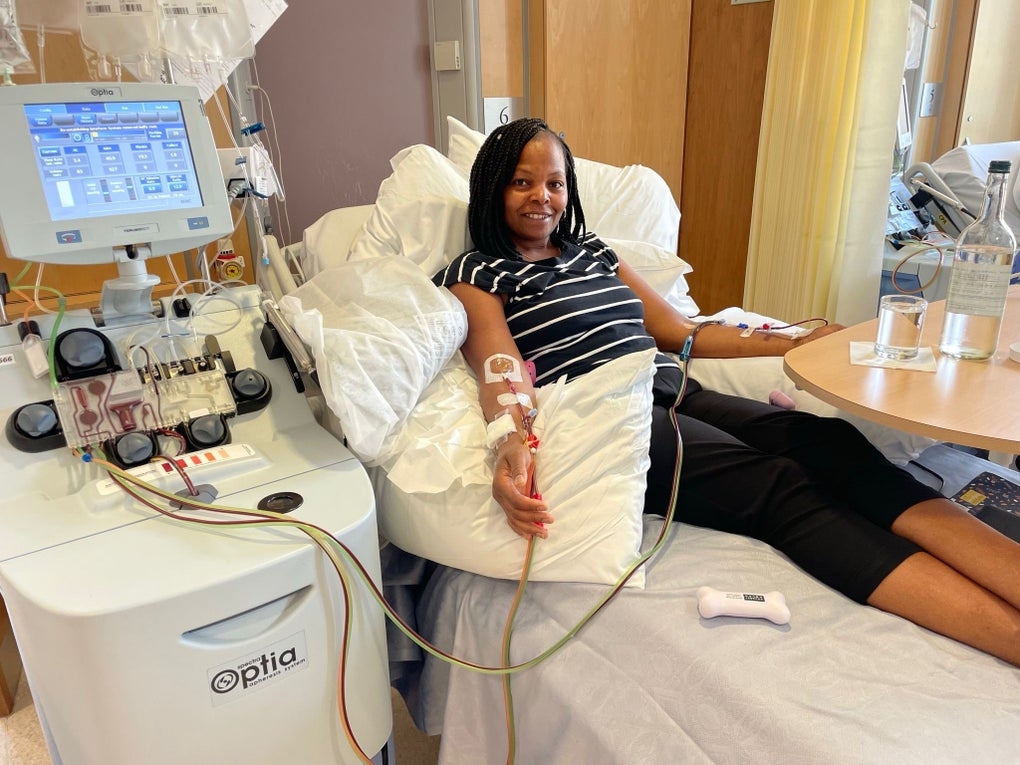
'Anyone can be a hero'
“Look at me, I am 100% fine: really soon after I’d donated my stem cells the levels in my body were completely back to normal. Just go for it – get registered as a donor! You never know what might be around the corner and whether it might be someone you know who urgently needs a transplant, and all it costs is your time.”
Purity Kiarii, 49, who lives in Hertfordshire, is a busy mother of two teenage daughters and a ten-year-old son. She works as a session sister for the NHS Blood and Transplant (NHSBT) and recently became a stem cell donor herself.
Responding to a donor appeal
“I got registered back in 2013, after watching a news report on TV about the work of KKLT, the Kevin Kararwa Leukaemia Trust, explains Purity. "They were appealing for more potential stem cell donors from black and minority ethnic backgrounds to come forward. Kevin Kararwa had been diagnosed with leukaemia in 2012, but sadly died before a donor who was a suitable match could be found for him.
“I didn’t know that KKLT were working in partnership with DKMS, but their motto is ‘Anyone can be a hero’ and I just thought ‘If I can help, I will’. So, I signed up.
“To be honest, I forgot all about it, other than getting the emails from DKMS to check that my contact details were still correct. The years went by, and life is always busy!
“Then a close family member became very ill and needed to have a heart transplant. It made me think a lot about how important it is for people to become donors of all sorts.
“Out of the blue earlier this year I received a text message from DKMS to say I was one of several potential matches for someone needing a stem cell transplant. Initially, I wasn’t seen as the primary match, but then two days later they called me and asked me to donate. I couldn’t believe it, I was really surprised!”
Generating stem cells for donation
Purity had blood tests to double-check that she was a match. She had recently travelled to see family in Kenya, which meant checks to rule out the possibility of malaria were needed, but then a donation date was fixed.
In the run-up, like all donors, Purity was given a drug with the growth factor G-CSF for a period of five days. A hormone-like substance, G-CSF occurs naturally in the body and increases the number of stem cells that are produced and flushed into the bloodstream. This is important because it generates sufficient quantities of stem cells to be taken from the arm vein.
“I started doing injections at home to prepare my body to donate. I did get a few side effects – some aches and sleeplessness – but DKMS had explained that this might happen, and they weren’t that bad: I was able to manage them with paracetamol.
“At that point, I knew nothing at all about the person who would receive my stem cells – I wondered if it was someone in this country.
“My family were a bit nervous for me, but excited. I was booked into a London hospital for two days. My work was 100 per cent supportive and gave me special annual leave, and actually, I was able to hit the target of stem cells needed on the first day. I’d taken a book with me to read, but I didn’t even open it, because I was on my phone all the time, messaging with friends and family who wanted to know how it was all going!
“Then they told me my patient was a young woman in the United States – I just hoped that I had been able to give her a therapeutic dose.
Dispelling myths
“Because of my Kenyan heritage, I know there can be reluctance within African communities to register as potential donors. There can be lots of myths about donating being dangerous, a mistrust of the medical profession or even in some communities there are fears that witchcraft is involved.
“It’s 100% important for people to see that I have donated, that I’m in a good place," concludes Purity. I am very happy to tell my story and educate people: look at me, I am absolutely fine! So please get registered today – you could be giving someone a second chance at life.”





